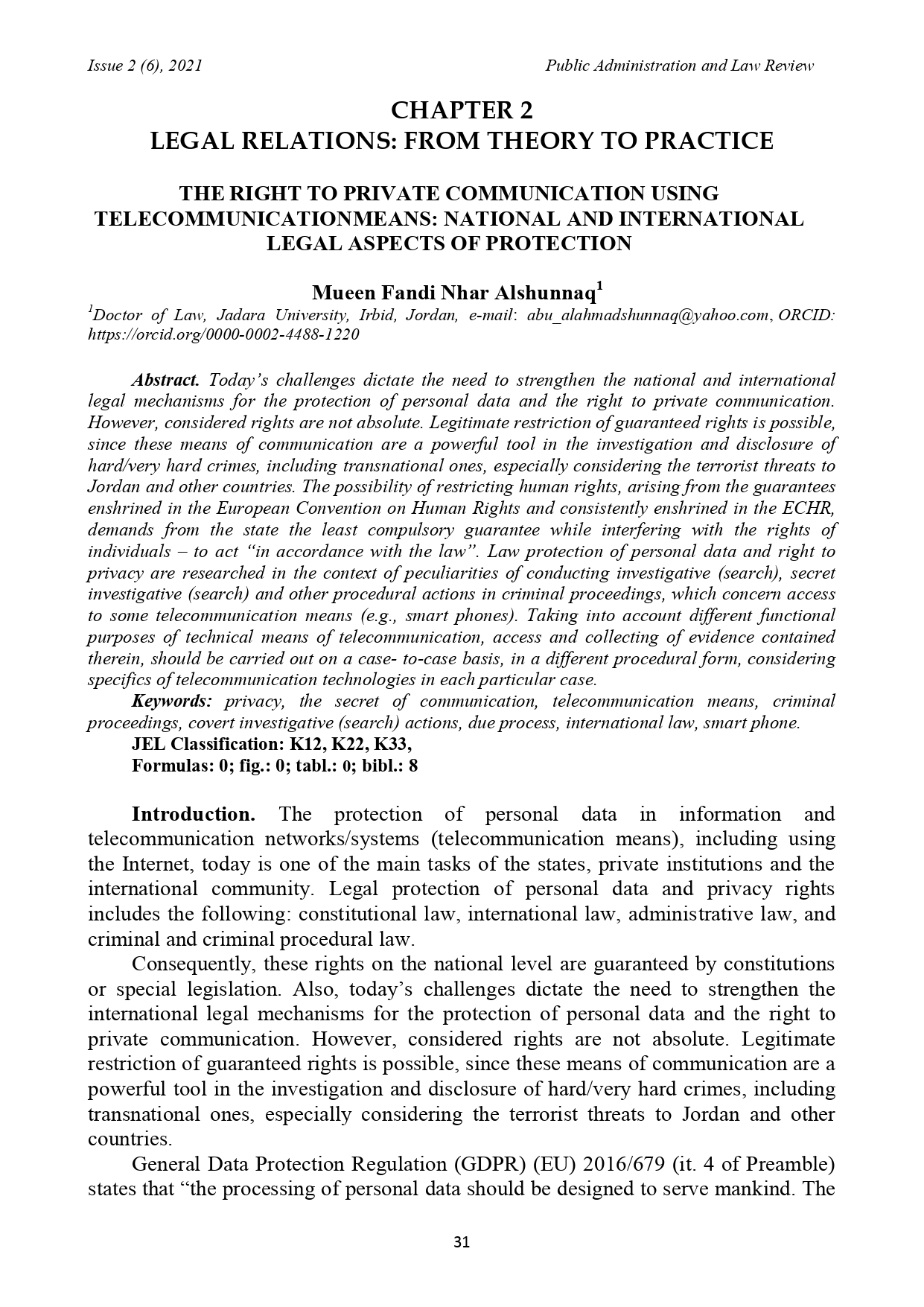THE RIGHT TO PRIVATE COMMUNICATION USING TELECOMMUNICATION MEANS: NATIONAL AND INTERNATIONAL LEGAL ASPECTS OF PROTECTION
DOI:
https://doi.org/10.36690/2674-5216-2021-2-31Keywords:
privacy, the secret of communication, telecommunication means, criminal proceedings, covert investigative (search) actions, due process, international law, smart phoneAbstract
Today’s challenges dictate the need to strengthen the national and international legal mechanisms for the protection of personal data and the right to private communication. However, considered rights are not absolute. Legitimate restriction of guaranteed rights is possible, since these means of communication are a powerful tool in the investigation and disclosure of hard/very hard crimes, including transnational ones, especially considering the terrorist threats to Jordan and other countries. The possibility of restricting human rights, arising from the guarantees enshrined in the European Convention on Human Rights and consistently enshrined in the ECHR, demands from the state the least compulsory guarantee while interfering with the rights of individuals – to act “in accordance with the law”. Law protection of personal data and right to privacy are researched in the context of peculiarities of conducting investigative (search), secret investigative (search) and other procedural actions in criminal proceedings, which concern access to some telecommunication means (e.g., smart phones). Taking into account different functional purposes of technical means of telecommunication, access and collecting of evidence contained therein, should be carried out on a case- to-case basis, in a different procedural form, considering specifics of telecommunication technologies in each particular case.
Downloads
References
Available at: https://eur-lex.europa.eu/legal- content/EN/TXT/?qid= 1549487787863 &uri=CELEX:32016R0679 (accessed on February 5, 2019)
Recommendation CM/Rec (2018) 2 of the Committee of Ministers to member States on the roles and responsibilities of internet intermediaries (Adopted by the Committee of Ministers on 7 March 2018 at the 1309th meeting of the Ministers’ Deputies). Available at: https://search.coe.int/cm/Pages/result_details.aspx? ObjectID=0900001680790e14(accessed on February 5, 2019)
See in particular item 133 of Judgement in Case of Benedik v. Slovenia, April 24, 2018. Available: at https://www.echr.com.ua/translation/sprava- benedik-proti-slovenii- povnij-tekst-rishennya/ (accessed on September 30, 2018)
Case of Klass and Others v. Germany, September 6, 1978. The data is taken from: https://www.echr.coe.int/Documents/FS_Mass_surveillance_ENG.p df (accessed on September 30, 2018)
Dita Plepa. L¯ıdzsvara mekle¯jumi starp pamatties¯ıbu ieve¯rošanu un valsts droš¯ıbas aizsardz¯ıbu Satversmes tiesas prakse¯. Socrates: RSU elektroniskais juridisko zina¯tnisko rakstu žurna¯ls. № 2 (5). P. 56–73. P. 70. (2016). Available at: https:// www.rsu.lv/sites/default/files/imce/Dokumenti/izdevumi/socrates_5_2016.pdf (accessed on February 5, 2019)
The data is taken from the official web-portal of the National Commission for the State Regulation of Communications and Informatization. Available at: https:// nkrzi.gov.ua/index.php?r=site/index&pg=59&id=4182&language=u k (accessed on September 30, 2018)
An exception to this is, for example, Viber and some others where information on the content of messages, sent files, etc. is physically contained (stored) in the memory of a technical device itself since, as the company claims, information content of messages is deleted from the servers of the company as soon as a message is sent to an end user. See more about Viber’s privacy and security policy. Available at: https://www.viber.com/security (accessed on September 30, 2018) On the protection of natural persons with regard to the processing of personal data by competent authorities for the purposes of prevention, investigation, detection or prosecution of criminal offences or the execution of criminal penalties, and the free movement of such data and repealing Council Framework Decision 2008/977/JHA: Directive (EU) 2016/680 of the European Parliament and of the Council, of 27 April 2016. Available at: https:///eur-lex.europa.eu/legalcontent/en/TXT/%3Furi%3 DCELEX%253A32016L0680&prev=search (accessed on February 5, 2019)
On the use of passenger name record (PNR) data for the prevention, detection, investigation and prosecution of terrorist offences and serious crime: Directive (EU) 2016/681 of the European Parliament and of the Council, of 27 April 2016. Available at: https://consilium.europa.eu/en/press/press-releases/2016/04/21-council-adopts-eu-pnr-directive/&prev=search (accessed on February 5, 2019).

Downloads
Published
How to Cite
Issue
Section
License
Copyright (c) 2021 “Scientific Center of Innovative Researches” OÜ

This work is licensed under a Creative Commons Attribution-NonCommercial-NoDerivatives 4.0 International License.





